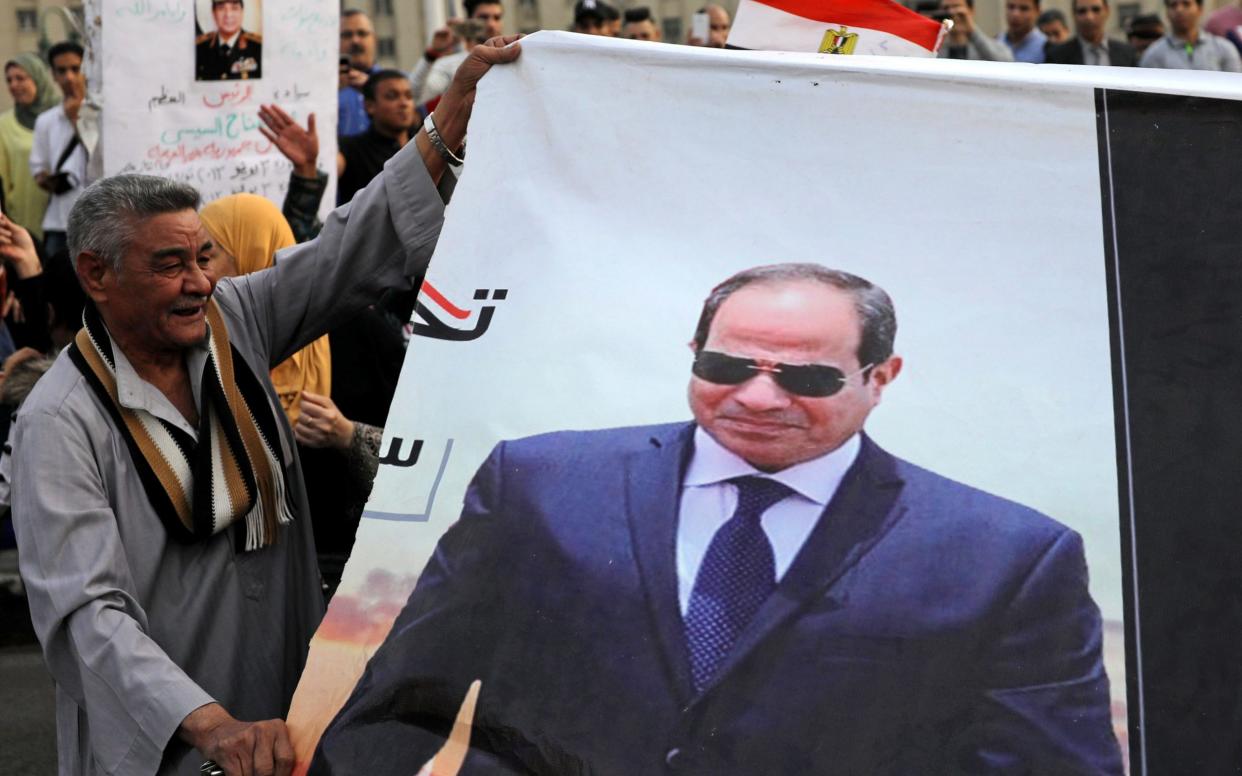Egypt's Sisi wins 97 percent in election with no real opposition

Egyptian President Abdel Fattah al-Sisi has been re-elected with 97 percent of votes, the same proportion that the former military commander secured four years ago for his first term but with a lower turnout, official results showed on Monday.
Turnout was 41 percent, despite efforts to get as many Egyptians as possible to polling stations during last week's vote. Mr Sisi had been virtually guaranteed a landslide win, confirmed by early tallies as voting ended on Wednesday.
The election featured only one other candidate - himself an ardent Sisi supporter - after all serious opposition contenders halted their campaigns in January. The main challenger was arrested and his campaign manager beaten up, while other presidential hopefuls pulled out, citing intimidation.
Mr Sisi said he had wanted more candidates to run and that he had nothing to do with the opposition withdrawals.
The election commission said the vote was held according to the "highest international standards of integrity and transparency" as it read out the results in a televised announcement.
Egypt's 2011 revolutionaries reflect as Sisi consolidates power
Mr Sisi won 21.8 million votes compared with 656,534 for his opponent, Moussa Mostafa Moussa, whose tally was fewer than the 1.8 million spoiled ballots.
"The sight of Egyptian citizens from all walks of society lining up was impressive and inspiring," Mr Sisi said in a speech to the nation.
Thousands of Egyptians waving flags celebrated the victory in several of the country's governorates just after the results.

Critics have said the lower turnout is a potential setback for Mr Sisi, who suggested before the vote that he saw it as a referendum on his presidency rather than a genuine contest. Turnout in the 2014 vote was 47 percent.
The election has revealed "obvious problems related to participation and the reluctance of young people (to vote)", said a statement from politician Mohamed Anwar Sadat, a candidate who withdrew in January citing intimidation of his supporters.
State media had portrayed failure to vote as a betrayal of Egypt. Some voters said they were offered incentives to cast their ballots including money and food, local and international media reported, but did not say who had made the offers.
Officials said that if any such incidents took place they were not state-sponsored and extremely limited.
Critics say former general Sisi's popularity has been eroded amid tough economic reforms, which have left most Egyptians worse off, and also an unprecedented crackdown on dissent.
His supporters say those measures are needed to stabilise the country, which faces a stubborn Islamic State insurgency in the northern Sinai Peninsula and which was rocked by unrest after the 2011 uprising that ousted veteran leader Hosni Mubarak.
Mr Sisi led the 2013 military overthrow of Egypt's first freely-elected president, Mohamed Mursi of the Muslim Brotherhood, after protests against Mursi. Sisi swept to victory in an election a year later with 97 percent of the vote.

The United Nations expressed concern over the crackdown on dissent, including the media, which took place before last week's vote.
In a call to Mr Sisi on Monday, US President Donald Trump expressed his "sincere congratulations" and said the United States was keen on strengthening strategic relations, according to Egyptian state news agency MENA.
Mr Trump has been a strong supporter of Mr Sisi, describing him as a "fantastic guy" and inviting him to the White House, something former president Barack Obama had never done.
British foreign minister Boris Johnson appeared to strike a more cautious tone.
Look forward to working w/ President Sisi’s government in his 2nd constitutional term. Egypt has an opportunity over next 4 years to build a prosperous & democratic society, building on rights set out in 2014 constitution. UK will remain a leading partner in achieving this goal.
— Boris Johnson (@BorisJohnson) April 2, 2018
Mr Sisi's main Western and regional allies have been mostly silent over alleged human rights abuses in Egypt.
The US State Department said it had noted "reports of constraints on freedoms of expression and association in the run-up to the elections" and "will continue to encourage a broadening of opportunities for political participation for Egyptians, and emphasize the importance of the protection of human rights and the vital role of civil society in Egypt."
Russia congratulated Mr Sisi on his election win ahead of the official results, and regional ally King Salman of Saudi Arabia called Sisi on Monday to express support, saying his victory came as a result of strong efforts to combat terrorism.

